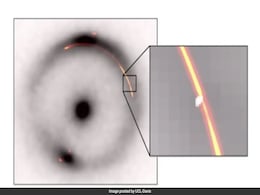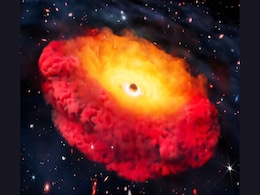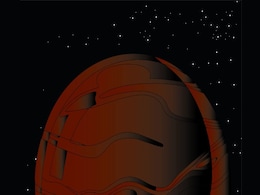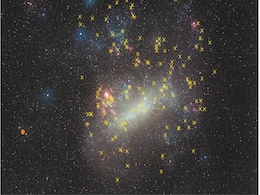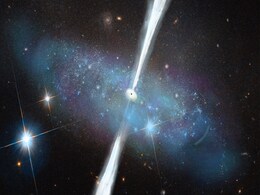Detecting Dwarf Galaxies
- All
- News
-

Dark Matter May Have Been Seen for the First Time in NASA Gamma-Ray Data
- Wednesday November 26, 2025
A new analysis of NASA’s Fermi telescope data reveals a faint gamma-ray halo around the Milky Way’s core, matching predictions for annihilating dark-matter particles. Researchers say no known astrophysical source fits the signal, raising the possibility of the first direct evidence of dark matter. Experts, however, stress caution and call for v...
-
 www.gadgets360.com
www.gadgets360.com
-

Astronomers Spot Mysterious Dark Object In Distant Universe, It's A Million Times Larger Than The Sun
- Tuesday October 14, 2025
- Science |
A mysterious object with a mass equivalent to 1 million suns has been detected in space, but its nature remains unknown.
-
 www.ndtv.com
www.ndtv.com
-

Astronomers Discover Rogue Black Hole Racing Through a Distant Dwarf Galaxy
- Sunday September 14, 2025
Astronomers have discovered a rogue intermediate-mass black hole speeding through a dwarf galaxy 230 million light-years away. Unlike typical galactic centres, this displaced object is accreting material and blasting out jets, suggesting black holes can grow “offsite”. The finding offers rare evidence of elusive intermediate black holes and may...
-
 www.gadgets360.com
www.gadgets360.com
-

Dark Dwarfs: New Star-Like Objects May Reveal Nature of Dark Matter
- Wednesday July 9, 2025
Scientists have proposed a new class of stellar objects called “dark dwarfs,” sub-stellar bodies that may glow faintly from the energy released by annihilating dark matter particles. Found near the galaxy’s core, these objects could hold crucial clues about the elusive nature of dark matter. Powered not by fusion but by WIMP-like particles, d...
-
 www.gadgets360.com
www.gadgets360.com
-

Strange Fast Radio Bursts Emerge from an Ancient Dead Galaxy, Baffling Scientists
- Monday February 24, 2025
Scientists have detected mysterious fast radio bursts (FRBs) from the outskirts of an 11 billion-year-old dead galaxy. This discovery challenges the belief that FRBs primarily originate from young, star-forming galaxies. Researchers suspect the bursts may result from colliding stars or a collapsing white dwarf. The Canadian Hydrogen Intensity Mappi...
-
 www.gadgets360.com
www.gadgets360.com
-

Scientists Discover Two New Supernova Remnants in a Surprising Location
- Thursday February 13, 2025
Two previously unknown supernova remnants, J0624-6948 and J0614-7251, have been detected in the outskirts of the Large Magellanic Cloud. Their unexpected location suggests a higher-than-expected concentration of ionised gas, raising new questions about galactic evolution. Scientists propose that gravitational interactions between the Milky Way and ...
-
 www.gadgets360.com
www.gadgets360.com
-

Strange Repeating Fast Radio Burst (FRB) Originating From Distant Galaxy Detected by Scientists
- Thursday June 9, 2022
- Edited by Gadgets 360 Newsdesk
The detection of a new and strange fast radio burst originating from a galaxy located 3 billion light-years away has left astronomers puzzled. Fast Radio Burst or FRB are bursts of radio waves in space that are milliseconds long. The latest finding has caused the astronomers to speculate if there are two kinds of fast radio bursts.
-
 www.gadgets360.com
www.gadgets360.com
-

Astronomers Discover Hidden Trove of Massive Black Holes, Can Help Understand the Milky Way’s Origin
- Thursday May 26, 2022
- Edited by Gadgets 360 Newsdesk
A group of researchers has found a previously overlooked trove of massive black holes in dwarf galaxies. These black holes, the researchers believe, can offer insights into the journey of the supermassive black hole that sits at the centre of the Milky Way.
-
 www.gadgets360.com
www.gadgets360.com
-

Astronomers Detect Mini-Supermassive Black Hole That May Shed Light on How They Grow
- Wednesday January 12, 2022
- Edited by Gadgets 360 Newsdesk
Using NASA's Chandra X-ray Observatory, researchers have identified a black hole having 200,000 times the mass of the Sun in Mrk 462, a dwarf galaxy with only several hundred million stars. In comparison, our Milky Way has a few hundred billion stars.
-
 www.gadgets360.com
www.gadgets360.com
-

Faintest Satellite Galaxy Of Milky Way Discovered
- Wednesday November 23, 2016
- World News | Press Trust of India
Scientists have detected a dwarf satellite galaxy, believed to be the faintest yet found in the halo of the Milky Way, a discovery that provides important insights into galaxy formation and how dark matter contributes to it.
-
 www.ndtv.com
www.ndtv.com
-

There's a New Earth-Size Planet in the Neighborhood (Galactically Speaking)
- Friday November 13, 2015
- World News | Joel Achenbach, The Washington Post
The yeoman work of NASA's Kepler Space Telescope has revealed our Milky Way galaxy to be lousy with planets - surely tens of billions of them, if you extrapolate from what Kepler has detected so far in a small patch of the sky.
-
 www.ndtv.com
www.ndtv.com
-

Dark Matter May Have Been Seen for the First Time in NASA Gamma-Ray Data
- Wednesday November 26, 2025
A new analysis of NASA’s Fermi telescope data reveals a faint gamma-ray halo around the Milky Way’s core, matching predictions for annihilating dark-matter particles. Researchers say no known astrophysical source fits the signal, raising the possibility of the first direct evidence of dark matter. Experts, however, stress caution and call for v...
-
 www.gadgets360.com
www.gadgets360.com
-

Astronomers Spot Mysterious Dark Object In Distant Universe, It's A Million Times Larger Than The Sun
- Tuesday October 14, 2025
- Science |
A mysterious object with a mass equivalent to 1 million suns has been detected in space, but its nature remains unknown.
-
 www.ndtv.com
www.ndtv.com
-

Astronomers Discover Rogue Black Hole Racing Through a Distant Dwarf Galaxy
- Sunday September 14, 2025
Astronomers have discovered a rogue intermediate-mass black hole speeding through a dwarf galaxy 230 million light-years away. Unlike typical galactic centres, this displaced object is accreting material and blasting out jets, suggesting black holes can grow “offsite”. The finding offers rare evidence of elusive intermediate black holes and may...
-
 www.gadgets360.com
www.gadgets360.com
-

Dark Dwarfs: New Star-Like Objects May Reveal Nature of Dark Matter
- Wednesday July 9, 2025
Scientists have proposed a new class of stellar objects called “dark dwarfs,” sub-stellar bodies that may glow faintly from the energy released by annihilating dark matter particles. Found near the galaxy’s core, these objects could hold crucial clues about the elusive nature of dark matter. Powered not by fusion but by WIMP-like particles, d...
-
 www.gadgets360.com
www.gadgets360.com
-

Strange Fast Radio Bursts Emerge from an Ancient Dead Galaxy, Baffling Scientists
- Monday February 24, 2025
Scientists have detected mysterious fast radio bursts (FRBs) from the outskirts of an 11 billion-year-old dead galaxy. This discovery challenges the belief that FRBs primarily originate from young, star-forming galaxies. Researchers suspect the bursts may result from colliding stars or a collapsing white dwarf. The Canadian Hydrogen Intensity Mappi...
-
 www.gadgets360.com
www.gadgets360.com
-

Scientists Discover Two New Supernova Remnants in a Surprising Location
- Thursday February 13, 2025
Two previously unknown supernova remnants, J0624-6948 and J0614-7251, have been detected in the outskirts of the Large Magellanic Cloud. Their unexpected location suggests a higher-than-expected concentration of ionised gas, raising new questions about galactic evolution. Scientists propose that gravitational interactions between the Milky Way and ...
-
 www.gadgets360.com
www.gadgets360.com
-

Strange Repeating Fast Radio Burst (FRB) Originating From Distant Galaxy Detected by Scientists
- Thursday June 9, 2022
- Edited by Gadgets 360 Newsdesk
The detection of a new and strange fast radio burst originating from a galaxy located 3 billion light-years away has left astronomers puzzled. Fast Radio Burst or FRB are bursts of radio waves in space that are milliseconds long. The latest finding has caused the astronomers to speculate if there are two kinds of fast radio bursts.
-
 www.gadgets360.com
www.gadgets360.com
-

Astronomers Discover Hidden Trove of Massive Black Holes, Can Help Understand the Milky Way’s Origin
- Thursday May 26, 2022
- Edited by Gadgets 360 Newsdesk
A group of researchers has found a previously overlooked trove of massive black holes in dwarf galaxies. These black holes, the researchers believe, can offer insights into the journey of the supermassive black hole that sits at the centre of the Milky Way.
-
 www.gadgets360.com
www.gadgets360.com
-

Astronomers Detect Mini-Supermassive Black Hole That May Shed Light on How They Grow
- Wednesday January 12, 2022
- Edited by Gadgets 360 Newsdesk
Using NASA's Chandra X-ray Observatory, researchers have identified a black hole having 200,000 times the mass of the Sun in Mrk 462, a dwarf galaxy with only several hundred million stars. In comparison, our Milky Way has a few hundred billion stars.
-
 www.gadgets360.com
www.gadgets360.com
-

Faintest Satellite Galaxy Of Milky Way Discovered
- Wednesday November 23, 2016
- World News | Press Trust of India
Scientists have detected a dwarf satellite galaxy, believed to be the faintest yet found in the halo of the Milky Way, a discovery that provides important insights into galaxy formation and how dark matter contributes to it.
-
 www.ndtv.com
www.ndtv.com
-

There's a New Earth-Size Planet in the Neighborhood (Galactically Speaking)
- Friday November 13, 2015
- World News | Joel Achenbach, The Washington Post
The yeoman work of NASA's Kepler Space Telescope has revealed our Milky Way galaxy to be lousy with planets - surely tens of billions of them, if you extrapolate from what Kepler has detected so far in a small patch of the sky.
-
 www.ndtv.com
www.ndtv.com


